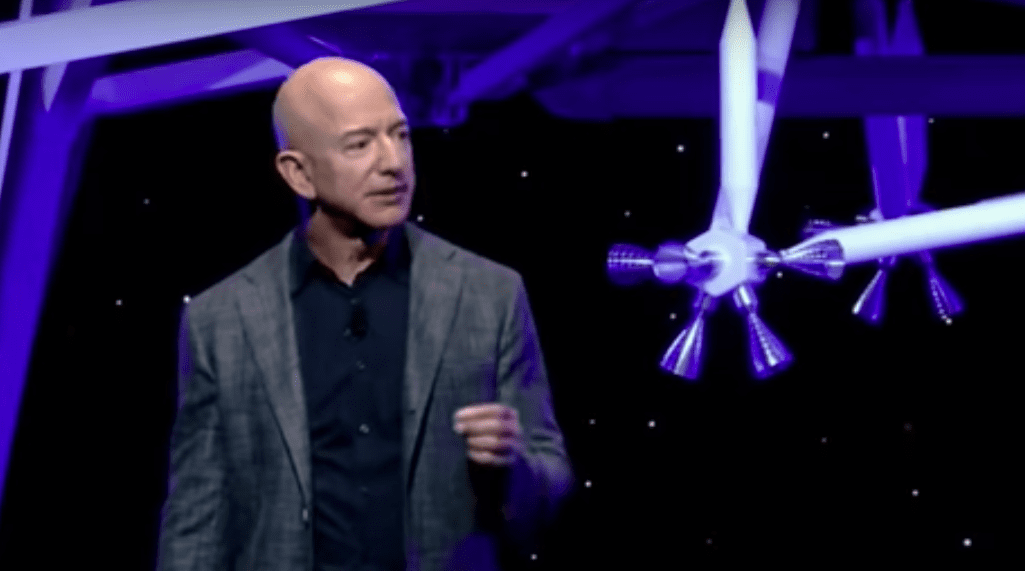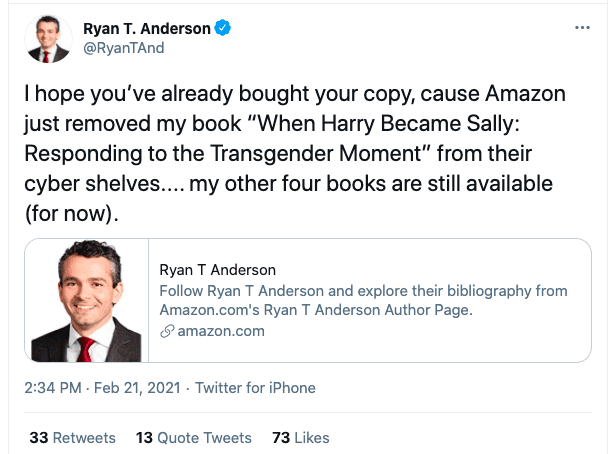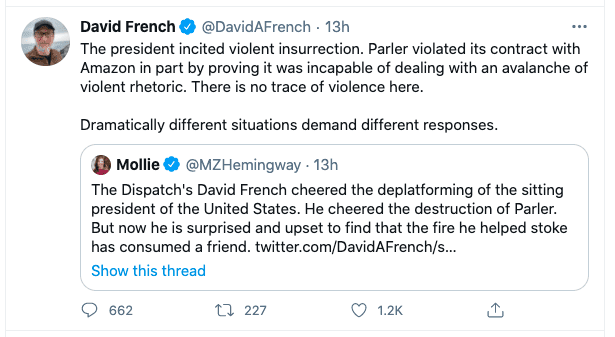Amazon Cancels Ryan T. Anderson Book

This is alarming news:

You can still buy the book directly from the publisher, and perhaps from other distributors.
I read the book in 2018, when it came out. It’s first-rate. Anderson is critical of gender ideology, but his book is well-argued and supported by scientific findings. If you don’t agree with him, fine, but give him a chance to make his argument. That’s what we do in a free society.
Amazon is a private business, and in a free society, that means it has the right to refuse to sell anything. Note well that it is selling a pro-trans book titled, Let Harry Become Sally. What’s more, Amazon is also currently selling Hitler’s Mein Kampf.
That’s right: Jeff Bezos will sell you Hitler’s autobiography, because he correctly trusts readers to understand that malignant book. But he will not sell you a book by the head of a major American think tank, making an argument critical of gender ideology, because … why?
Last year, a coalition of US publishers, booksellers, and authors wrote to Congress to ask for anti-trust action to fight Amazon’s total dominance of the book industry. Their letter said, in part:
Amazon’s scale of operation and share of the market for book distribution has reached the point that no publisher can afford to be absent from its online store.
A year ago, The New York Times reported that Amazon controlled 50 percent of all book distribution, but for some industry suppliers, the actual figure may be much higher, with Amazon accounting for more than 70 or 80 percent of sales. Whether it is the negative impact on booksellers of Amazon forcing publishers to predominantly use its platform, the hostile environment for booksellers on Amazon who see no choice but to sell there, or Amazon’s predatory pricing, the point is that Amazon’s concomitant market dominance allows it to engage in systematic below-cost pricing of books to squash competition in the book selling industry as a whole.
Remarkably, what this means is that even booksellers that avoid selling on Amazon cannot avoid suffering the consequences of Amazon’s market dominance.
The ongoing COVID-19 crisis is exacerbating the problem: it continues to threaten the financial well-being of authors, publishers, and booksellers, some of whom will not survive the year.
Amazon, by contrast, with its ever-extensive operation and data network, has grown only more dominant, enjoying its largest-ever quarterly profits during April, May and June.
Amazon can’t claim it isn’t selling the book because there’s no demand for it. When it was first published, When Harry Became Sally made the bestseller lists.
This is a nakedly political decision by Amazon, which is more afraid of Americans reading Ryan T. Anderson on gender ideology than they are of Americans reading Hitler on his Kampf.
Here’s what this decision means: given Amazon’s power, no publisher is going to publish future titles critical of gender ideology if they risk those titles being de-listed by Amazon. You can still buy Abigail Shrier’s bestselling Irreversible Damage: The Transgender Craze Seducing Our Daughters on Amazon — but hurry, because it is probably just a matter of time before Bezos cancels it.
You may be a pro-trans person who is perfectly fine with Amazon doing this. You should think twice. A company with the power to prevent books on certain themes from being published, simply because of its might in the retail sphere, is not always going to make decisions of which you approve. It is time for Congress to take antitrust laws seriously in Amazon’s case.
The novelist and essayist Walter Kirn tweeted the other day that now is the time for people to start buying hard copies of books that might be “problematic” — that is, books that the progressive censors might want to disappear from the culture’s memory. He’s right. Make a list of books — classics, whatever — that might be endangered by the Woke, and start buying hard copies now, for yourself, for your kids, for the future. They will be precious before you know it.
UPDATE: There’s a lot of this going around today:

French responded:

This is a complicated question. I’m not used to siding with David French on these matters, but I can’t see where he’s wrong, unless you take an absolutist view of the First Amendment, which almost nobody does.
Does anyone believe that Twitter should be legally obliged to keep Donald Trump or any politician on its platform? Twitter was correctly dunked, and dunked often, for its double standards. Regarding January 6, Trump behaved abominably, in a way that has no historical precedent for a US president. Still, Twitter might have made the wrong decision there, but it’s easy for me to understand why they made the call that they did. They weren’t banning conservative politicians across the board; they deplatformed a single politician after an extraordinary event that he used their platform to help organize.
Parler is a harder call. I was not on it, but wish they had left it alone. Still, if its organizers could not prevent “an avalanche of violent rhetoric,” and this was in violation of their contract, do people really believe that a law should have prevented Amazon from cutting ties with Parler, despite the contract violation? If not, then French is making a judgment call here. He might be wrong about that, but there’s no hypocrisy regarding his stance against Amazon on the Ryan T. Anderson matter.
As French points out, both the Trump and Parler cases involved extraordinary instances of violent rhetoric, which, in the January 6 case, turned into actual violence. I moderate this blog to keep out violent, abusive rhetoric; if you saw what I didn’t allow on this site, you’d be a lot more depressed by the human condition. I’m not violating anybody’s First Amendment rights. I simply want to enforce certain standards here. There are some readers who think that I’m too permissive, and others who think I’m too restrictive. If I were ever told that I couldn’t moderate the comments, then I would ask not to have a comments section, because exercising editorial judgment is central to my work here.
In Amazon’s case, it is perfectly understandable that they would exercise the right to use editorial judgment in what they sell. Unless you believe that (for example) a Christian bookstore should be obliged morally and legally to sell The Satanic Bible, you also believe that a retailer should have the right to set its own policies. French is complaining here that Amazon has made an error in judgment by delisting Ryan Anderson’s book. He’s not saying that Amazon has broken the law. Where is the hypocrisy?
I have framed the answer to the Amazon problem as one of enforcing antitrust law. The problem with what Amazon has done is not so much that it hurts Ryan Anderson’s sales (though that’s a problem; people deserve to hear his argument!), but that it will have a chilling effect on all future books that take a critical line on progressive gender ideology. As I explain above, if a publisher has reason to believe that Amazon will not sell a title that does not go along with the progressive line, that publisher can’t afford to take a chance on the book. This is because of the tremendous power Amazon’s marketplace share exercises over book retailing.
This is a very big deal! No company should have that kind of power over something as crucial to the functioning of a liberal democracy as publishing. You might cheer for Amazon doing that today, because it makes it more likely that your political opponents will be silenced. But what happens if tomorrow Amazon decides to de-list a prominent title by someone whose views you like? As I said above, if Jeff Bezos became a fundamentalist Christian tomorrow, and started refusing to sell titles that conflicted with his deepest convictions, you would see publishers in this country start to follow Bezos’s line, because they have to be able to sell on Amazon to stay alive. Is that really good for America? Is that the kind of country you want to live in: one in which decisions on what gets published and what doesn’t are made not based on what the audience will buy, but based on what a single company will sell?
Amazon sells Hitler’s Mein Kampf. If I ran Amazon, I wouldn’t sell that, but I understand why they do: because it is of historic significance, and they trust their readers to read it critically. If they will extend that trust to readers on the matter of an Ur-text of fascism, why won’t they do so with a well-reasoned book critical of transgender ideology? It is easy to understand why someone like David French would agree with Amazon and Twitter exercising editorial judgment to deplatform Trump and withdraw support for Parler, but criticize Amazon for this.
More broadly, though, this controversy reminds me of why I am so divided on the French-Ahmari dispute. Both guys are my friends, and I like and respect them both. I agree with Sohrab on the nature of liberalism, but I keep getting stumped on the French rejoinder: “If not liberalism, then what?” Leaving aside moral and intellectual arguments, and focusing just on practical politics, I cannot see any way for social and religious conservatives to protect ourselves in a country that is increasingly neither without standing behind liberal principles. The First Amendment is a liberal institution (if “institution” is the right word). It strictly limits the involvement of the state in suppressing speech, forbidding assembly, and interfering in religion. But one aspect of that limit is that the state can’t compel a retailer to sell books that he doesn’t want to sell, or newspapers from publishing stories that they don’t want to publish. Would you have it any other way? If so, say hello to Lifeway Christian Books selling The Satanic Bible by government decree.
Put another way, I cannot imagine a direct “solution” to the problem of Amazon delisting Ryan’s book that would be constitutional — if it would direct Amazon to keep selling the book. Besides, I don’t want the state telling booksellers what they have to put on their shelves. Again, though, the problem is with Amazon’s power in the book industry. That is something that the government can and should do something about.
But let’s say antitrust action breaks up Amazon’s book business. What happens if all the Little Amazons (cf. the Baby Bells) decide independently not to sell Ryan T. Anderson’s book? This is not hard to conceive happening, given that the Left dominates the publishing industry, and given how puritanical and illiberal the younger publishing workers and executives are. In that case, conservatives would have a problem that would be difficult to solve in a liberal polity. But we aren’t there yet.
Anyway, I am the kind of person who sees all the problems with liberalism, and think it is doomed … but can’t think of any plausible successor to liberalism that would be anything but worse for people like me.
Subscribe for as little as $5/mo to start commenting on Rod’s blog.